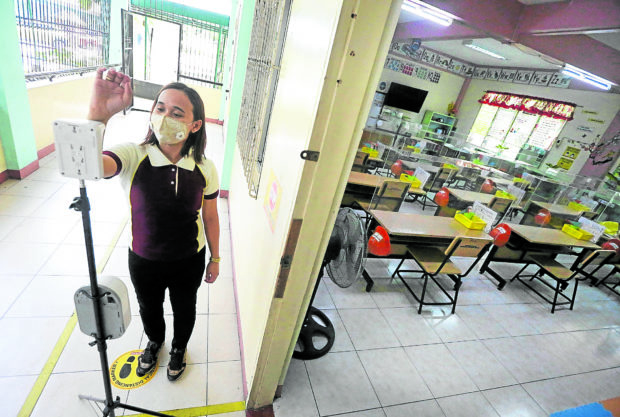
FILE PHOTO: Grade school teachers of Aurora Quezon Elementary school in Manila demonstrate how a face to face class would look like amid the pandemic, with plastic barriers separating each armchair from one another and teachers wearing PPE during class. INQUIRER/MARIANNE BERMUDEZ
MANILA, Philippines — The World Bank (WB) has pushed for the full opening of schools while reducing COVID-19 transmission in academic institutions to address learning poverty aggravated by the prolonged pandemic in low- and middle-income countries like the Philippines.
In a text message on Tuesday, Socioeconomic Planning Secretary Karl Kendrick Chua, also head of the National Economic and Development Authority (Neda), said the full opening of schools would be doable in the country.
“The sooner we can pilot more [in-person classes], then the sooner we can open more and all schools,” he added.
In the last quarter of 2021, the Department of Education (DepEd) was able to pilot in-person classes in selected areas with relatively low infections. But the surge in COVID-19 cases due to the Omicron strain at the start of 2022 forced schools to shut again.
‘Catastrophic impact’
A World Bank report titled “Prioritizing Learning During COVID-19: The Most Effective Ways to Keep Children Learning During and Post-Pandemic” warned that “without large-scale, effective and swift government action, the impact of the COVID-19 crisis on education [would] be catastrophic for children in low-income and middle-income countries.”
An Inquirer report last year on World Bank estimates showed that learning poverty—the share of 10-year-olds who cannot read nor understand a simple story—in the Philippines had hit a high of 90 percent as school children struggled with online and remote classes.
Before the pandemic, learning poverty in the country was already high at 69.5 percent.
In the new report, the World Bank recommended to “prioritize keeping schools and preschools fully open,” even as the Washington-based lender noted that “at the end of 2021, some school systems are still fully closed, and many are only partially open, while the spread of the Omicron variant threatens further restrictions.”
Prioritize education
“As governments make tough decisions about what activity to restrict in the face of new variants, the evidence suggests education must be prioritized: general economic activity has often recovered rapidly as lockdowns ease, but school closures have caused large and persistent damage to children’s education and future productivity, which is hard to address,” it said.
It also pointed to “accumulating evidence that children, especially younger children, are very unlikely to get severely ill from COVID-19, and teachers have low risk of catching COVID-19 from their students if mitigating action is taken.”
A lawmaker, meanwhile, urged Education Secretary Leonor Briones to address areas of noncompliance and prepare a transition plan for the reopening of public schools by the middle of the year for the new administration.
“The pilot program appears to have been largely successful, and I commend the [DepEd] for [its] efforts to prepare us for full reopening of the schools. At this rate, I am optimistic that we can reopen schools by August or September,” Albay Rep. Joey Salceda said in a statement.